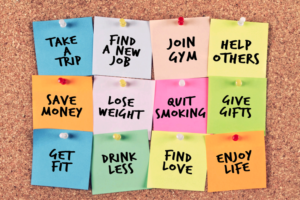As we begin the new year, many of us feel inspired to make positive changes in our lives. Traditionally, this has taken the form of New Year’s resolutions – specific, often quantitative goals we set for ourselves focused on tangible outcomes. Yet by mid-February, statistics reveal that most resolutions have already been abandoned. Why does this happen? And is there a more effective approach to making meaningful changes in our lives?
In recent years, there’s been a shift towards setting intentions instead. Intentions are broader, values-driven statements about how you want to approach life, rather than specific achievements. They emphasize the process rather than the outcome, focusing on behaviours and attitudes aligned with your personal values. Intentions are adaptable, allowing for flexibility and self-compassion as circumstances change.
This blog post will explore the differences between resolutions and intentions, how to align your intentions with your values, and strategies for managing setbacks while celebrating progress along the way.
Australian Statistics on New Years Resolutions
According to research from the comparison site Finder, 74% of Australians, have set a New Year’s resolution for 2025. Women (80%) are more likely than men (69%) to set goals for the new year. New Year’s resolutions are also more popular with younger generations, with 91% of Gen Z and 82% of millennials setting resolutions, compared to only 55% of baby boomers.
The most common New Year’s resolutions among Australians for 2025 are predominantly health-focused. According to recent surveys, the key resolutions include:
- Improve Diet and Nutrition: 39% of Australians aim to adopt healthier eating habits.
- Increase Fitness Levels: 37% plan to engage in more physical activity or exercise.
- Weight Loss: 33% have set goals to lose weight.
- Sleep Improvement: 17% wish to get more sleep.
- Travel More: 20% hope to travel overseas.
Unfortunately, the success rate for New Year’s resolutions in Australia is quite low. Statistics suggest that the vast majority of Australians – roughly 80% to 92% – do not successfully maintain their New Year’s resolutions throughout the year. The high failure rate highlights the difficulty many people face in sustaining long-term behavioural changes, despite their initial motivation and good intentions.
What Makes it Hard to Stick to Resolutions?
We often struggle to stick to their New Year’s resolutions for several key reasons:
- Unrealistic goal setting: Many people set overly ambitious or unrealistic goals, making them difficult to achieve and leading to early failure.
- Lack of proper planning: Resolutions often fail because they are poorly planned and poorly timed, without a clear strategy for implementation into daily life.
- Negative framing: Goals framed negatively, such as focusing on losing weight rather than improving health, can weaken motivation.
- Environmental challenges: Difficulty in maintaining resolutions due to unsupportive environments, such as household eating habits that conflict with health goals.
- Loss of motivation: Initial excitement wanes, and sustaining motivation becomes challenging over time.
- Underestimating habit strength: People often underestimate how strongly their behaviour is influenced by unconscious, automatic habits developed over time.
- Social influences: The behaviour of others in one’s social environment can trigger old habits or make attempts at change feel confronting.
- Poor timing: Starting resolutions during holiday seasons can make it difficult to integrate new behaviours into normal routines.
- Pressure and expectations: Feeling compelled to make immediate, significant changes due to societal or personal expectations can be overwhelming.
- Failure to adapt: Not having a plan to sustain new behaviours when returning to normal lifestyle after initial changes.
Resolutions vs. Intentions: Understanding the Difference
New Year’s resolutions are typically specific, outcome-focused goals. For example, “I will exercise for an hour, four times a week”, “I will spend less money on dining out”, “I will lose 10 kilograms this year”. While well-meaning, resolutions often come with rigid expectations, leading to disappointment when life gets in the way. Many people struggle to stick to their resolutions because they can feel overwhelming or unattainable, especially without a clear plan or personal connection to the goal.
Intentions, on the other hand, are more qualitative and focus on the journey rather than the destination. An intention might be “I will move my body regularly in ways that I enjoy”, “I will listen to my body’s needs and prioritize rest when I need it”, or “I will nurture my relationships by being fully present during conversations”. This approach allows for more flexibility and compassion in our personal growth journey.
Key Differences Between Resolutions and Intentions
| Aspect | Resolutions | Intentions |
| Focus | Outcome-focused | Process-focused |
| Approach | Rigid and specific | Flexible and adaptable |
| Motivation | Often driven by external pressures | Rooted in personal values and meaning |
| Success Measure | Achievement of a defined goal | Alignment with values and behaviours |
| Mindset | All-or-nothing, prone to failure | Growth-oriented, emphasises self-compassion |
| Adaptability | Limited | High |
The choice between resolutions and intentions depends on your goals and mindset. Resolutions can work well if you have a clear, measurable goal and a structured plan to achieve it, and if you’re prepared to follow through. However, for many, intentions provide a more holistic and compassionate framework, allowing for sustainable growth while prioritising personal well-being and values.
Identifying Your Core Values
Your intentions should reflect what truly matters to you, so before setting intentions, it’s crucial to identify your core values. These are the principles that guide your decisions and actions. Here’s how to uncover your values:
- Reflect on fulfilling moments: Think about times when you felt truly satisfied and ask yourself what values were being honoured in those moments. Examples might include connection, creativity, health, or growth.
- Visualise your ideal self: Imagine the version of yourself you aspire to be. What qualities and behaviours do they embody?
- Examine your actions: We often act in accordance with what’s most important to us, even if we’re not consciously aware of it.
Aligning Intentions with Your Values
Once you’ve identified your core values, you can set intentions that align with them. This alignment creates a sense of authenticity and purpose, leading to greater satisfaction in life. Here’s how to do it:
- Frame intentions positively: Instead of saying “I won’t procrastinate,” try “I will embrace timely and proactive actions”.
- Focus on the ‘why’ and ‘how’: Intentions are more about the motivation behind your goals and the process of achieving them.
- Make them broad and adaptable: An intention like “I intend to prioritise my physical well-being” allows for various actions that support this goal.
- Connect them to your values: If connection is a core value, an intention might be “I intend to nurture meaningful relationships in my life”.
Managing Setbacks with Self-Compassion
Setbacks are inevitable, whether you’re working on a resolution or an intention. The difference lies in how you respond. Self-compassion involves treating yourself with the same kindness you’d offer a friend. When you encounter a setback, instead of succumbing to self-criticism, practice these steps:
- Recognise that setbacks are normal: Everyone faces obstacles on their path to personal growth. Say to yourself, “This is hard right now, but it’s okay.”
- Challenge negative self-talk and practice self-kindness: Treat yourself with the same compassion you would offer a friend facing a similar challenge. Replace harsh thoughts with supportive ones. Instead of: “I’ve failed and will never succeed, try: “This is a temporary challenge. I’ve made progress and can keep going.”
- Use setbacks as learning opportunities: Reflect on what you can learn from the experience to inform your future efforts.
- Reaffirm your intentions: Return to your core values and intentions to regain focus and motivation. A setback doesn’t erase your commitment to what’s important.
- Recommit to Small Steps: Start again with a manageable action that aligns with your intention.
- Avoid comparison: Remember that everyone’s journey is unique, and comparing yourself to others can lead to unnecessary stress.
- Seek Support: Share your struggles with a trusted friend or therapist who can provide encouragement.
Celebrating Progress and Success
Acknowledging your achievements, no matter how small, is crucial for maintaining motivation and building confidence. Celebrations reinforce positive behaviours and remind you of how far you’ve come.
Here are some ways to celebrate your progress:
- Visual progress tracking: Use a journal or app to visually represent your progress. Use prompts like, “What intention can I focus on today?” or “How did I honour my values this week?”.
- Milestone rewards: Set up small rewards for reaching certain milestones in your journey.
- Share achievements: Tell supportive friends or family about your successes to boost your enthusiasm.
- Practice gratitude: Regularly reflect on what you’re grateful for in your journey.
- Self-care rituals: Incorporate activities you enjoy as a way to celebrate and recharge.
Remember, celebrating progress isn’t about bragging or wasting time. It’s a form of self-care that reinforces positive behaviour and builds resilience.
Conclusion
As we enter the new year, consider shifting from rigid resolutions to more flexible, value-aligned intentions. By focusing on the journey rather than just the destination, you create space for growth, self-compassion, and meaningful change. Remember to be kind to yourself during setbacks, celebrate your progress, and stay connected to your core values. This approach not only increases your chances of achieving your goals but also ensures that the process itself is fulfilling and aligned with who you truly want to be.
If you need support on this journey, our team of psychologists is here to help. Reach out to book a free 15-minute call and start 2025 with purpose and clarity.
Links & References
https://www.brainfirstinstitute.com/blog/aligning-with-values-the-neuroscience-of-values-based-actions
https://pmc.ncbi.nlm.nih.gov/articles/PMC7725288/
https://pmc.ncbi.nlm.nih.gov/articles/PMC535950/
https://www.sbs.com.au/news/article/is-your-new-years-resolution-doing-more-harm-than-good/84a4x5wv3
https://www.finder.com.au/insights/new-years-resolutions-statistics









